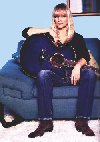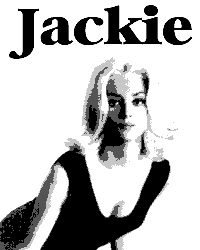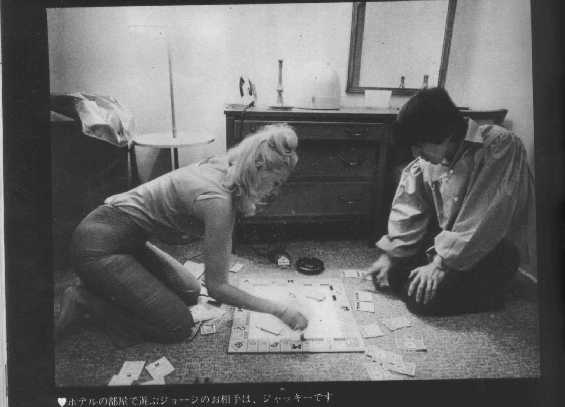
Princess of Pop, Hippie High Priestess, Goddess of the Love Generation, Smokin' Diva, Torchy Tunesmith - we're talking about Jackie DeShannon, of course. Singer of that famed recording of “What the World Needs Now, Is Love Sweet Love” by H. David / B. Bachrach, Jackie has written over 600 songs - mega hits like "Put a Little Love in Your Heart," "When You Walk in the Room," and "Bette Davis Eyes;" has appeared in numerous TV shows and movies (surf movies with Bobby Vinton), she has sung, performed, jammed, and recorded with greats like Elvis, Bruce Springsteen, Ella Fitzgerald, Annie Lennox, Al Green, Marianne Faithful, Twiggy, The Byrds, Gwynneth Paltrow, The Fleetwoods, Cher - she opened for the Beatles first USA tour in '64. Some of the movies in which her music has appeared are Forrest Gump, My Best Friend's Wedding, Duets, Drugstore Cowboy, and American Graffiti. - Her talent is bottomless. This amazing and popular woman has some pretty passionate new “paintings” going on.

A What was it like being on that first Beatles tour? Who was your favorite Beatle?
J John Lennon.
A How long did the tour last?
J Six weeks of sort of one nighters, up and away every day. We played to about eighty thousand people mainly, whatever the baseball stadiums would fit.
A Would you spend a lot of time with the Beatles when you were together?
J Not a lot of time. First time I met Paul he said, “I love your demos,” because we had the same publisher, Dick James Music, at that time. So they would go in the office and wanted to listen to what the other writers were doing from America.
A On that first Beatles tour?
J Yeah, 1964, but they only did half an hour. that's all they performed.
A What did you do with Elvis, what was he like? What were your experiences with Elvis?
J I went to see him in Las Vegas. He had all my albums, I couldn't believe it. You know, our mothers were very much alike.
A When did you meet him?
J When I came here, everyone was trying to meet him.
A How did you come to meet him?
J At that time, he would have a lot of people coming up to his house. It was very exciting. he was a very nice guy. [she does an impression of Elvis: I'm up here, honey.] (laughing)
A So he would just call you up on the phone?
J Yeah, to come over and jam.
A Why didn't you release your own recording of “Bette Davis Eyes”?
J It was a disagreement on the arrangement on “Bette Davis Eyes” with the person who was producing it. We had a demo that was much closer to the Kim Carnes version, and at that particular time, I wouldn't have had the leverage to insist that we do it that way...I was really unhappy with the way it ended up.
A Do you plan to record it the way you intended it to sound?
J Don't know. You know, it's a great record, the song is there and that's fine.
A Why did you take so long to record and perform again? What did you do for all those years? You were raising your son, but what put a stop to your career 20 years ago?
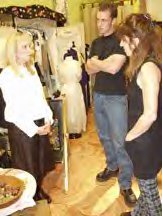 J Not having the freedom to control the work I did. And I was raising my son.
J Not having the freedom to control the work I did. And I was raising my son.
A So you just lost interest in it.
J I had had enough, until I could do it the way I wanted to, I wasn't going to do it. I was not going to subject my creativity to that kind of... today's different, they don't even question it, but back then it was like 'she's difficult to work with' if you suggested something.
A That was back then.
J And now it's just come to a place with the internet you can be free to make music for your fans, so they can reach you. That is amazing for me.
A When did you start doing that?
J Several years ago.
A Are you posting any new songs on the internet?
J No, I got my web site going and said I have the record out. People were just falling on the floor - they couldn't believe it - after all that time. You know, it wasn't a compilation, it was new songs.
A What was the thing that happened that brought you back to the recording studio? Did you do some performances first?
J My father was telling me that this guy was playing one of my records, “Turn Your Back On Me,” on this station, and I said, “You must be mistaken,” because it wasn't like the standard record, and he was a disc jockey that was able to play 60's music, so I called him up and he said he couldn't believe it, come down, let's do an interview, why don't we do an album.
A When was that? Two years ago?
J Yes. So I started thinking about it, I'm sort of shocked I did it. Every day I'm doing things, it's surprising to me, because this is about what following your passion does - it moves you, you don't move it. It's just like, we've been doing this now.
A So you're just going along with the agenda?
J I'm going along with the muse.
A But not anybody else's agenda?
J I never did.
A Now you're doing it your way, though?
J I always went with my agenda, I just couldn't execute it.
A How do you find the pop music scene changed since the 60's, when you came back in?
J I think the songs are what I miss most. There are some good songs, but not the kind of song-writing that I remember, that I like. Springsteen still does it. Paul Simon, and there are also good writers, but that doesn't dominate the charts.
A And it was such an explosion of song-writing in the 60's.
J It's more marketing now. Let's take this and market it, and it's kind of like the Marlboro sign - find the right guy that looks like this, and we'll just create eye or ear candy - this five second attention span and go from there.
A So what was it like playing at the Knitting Factory, McCabes, the Whisky and the Bottom Line in New York?
J I couldn't believe it at all. I've been overwhelmed every time we've done a show.
A You were at the Bottom Line last March.
J Yes.
A Tell us about it.
J First of all, I was so nervous because it's the house that Bruce built, and just to think of going on that stage, there was a time period when he was there five days, two shows a night, and breaking in Time and Newsweek at the same time, and Alan Pepper, who owns the Bottom Line, is a very generous and very sensitive person to art. He knows what it is. He has the passion for it, and his spirit is just awesome. So I did that first week at the Bottom Line, and it was just jammed, and I didn't know if anyone would come - I was so nervous. They knew the songs, they knew the new songs, and they came with the CD's and albums. It was amazing.
A Who was playing with you?
J They had an opening act, but the night was mine, it was my responsibility.
A And who was playing in the band that night?
J Glen Burkina of Styx put together a group.
A And you were just at the Knitting Factory here in LA last July. Who showed up to see you there?
J A lot of young people, that was so neat, it was very interesting because that kind of enthusiasm from a young audience is like nothing else. They're so open. That's why I always liked to do college tours- because if it was good, that was good enough. It didn't have to be on the charts. If they came to the concert, and it was good, they would like it, and they were fans - you built a fanbase. It was really nice to see a mixed audience... where half the audience is younger and the other half is [my] generation.
A On the new album, you know me, what are the references to Ingmar Bergman and Jackson Pollack about?
J It's back to what we were talking about - my influences, and also painters, you know. I can't imagine Jackson Pollack saying, “I have to put it on the top ten list this week, because black would sell more, or blue would sell more.” They don't approach it the same way, it's freer to me, much freer.
A You identity more with the painter, the freedom of those painters.
J Yes, and the freedom of Bergman making a film, whether you like it or not, he's going to make it his way - get over it - and Truffaut, all those people.
A What does the album mean to you? This album must be really special to you. It was the first time you were really able to do it your way.
J I think it gave me a tremendous amount - it restored my faith in what I started out to do. It's like meeting an old friend, and it was an extension of that friendship. Friendship meaning that writing - the meaning of life, the freedom to do it.
A So it's been a big success to you then?
J Very much so.
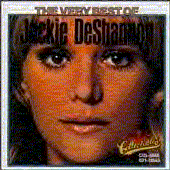 A How is your music different now? Forget all the fame, publishing and all that. Would you lump all your songs together? Or would you say, like, these songs are different than the ones you wrote 20 years ago?
A How is your music different now? Forget all the fame, publishing and all that. Would you lump all your songs together? Or would you say, like, these songs are different than the ones you wrote 20 years ago?
J I think their different sounding in the way technology is. It's in the way it's recorded.
A How about in the way you write songs?
J I don't see any difference. That's my process. I mean, I can sit down with a guitar, and in fact, we do two, three songs with just guitar and percussion.
A So you don't feel these songs have a different style than the songs you wrote before?
J No, I think they're very Jackie DeShannon. They're my style. But I think technology certainly made it easier to get the certain instruments together and made the process better, but they wouldn't be different unless I was trying to be someone else.
A Tell us about your next album.
J I'm in the process of trying to feel what it will be and then I will jump on it. Like, let's do this, let's do that - meaning “let's” is “me, myself and I.” All three of us. But I probably want to make it even more stark than it was, musically. I'm waiting, “hello, muse.”
A What are your other career goals?
J The happy story right now is the full page in Vanity Fair, which gives me a great deal of exposure. I'm very interested to see how this new painting will go - I know I want it big and stark, and as I said, I follow the muse, and that's when it always works perfectly for me. I never know, because, unless I'm told, I don't know.
A What about The Seeing Eye?
J That's something I've been working on for three years. I saw a documentary about Dorothy Hustis and Boris Frank. Dorothy was training dogs in Switzerland, Boris heard about this and sent her a letter. The blind at that point had nothing - a thing around their necks that said 'package.' Boris went there and worked with the trainer. He came back to New York with a dog, struggling, and they finally got it going, and people were requesting these dogs and that's how it got started, in 1929 - that was the first seeing eye institute. If you're interested, you can go to the web site, www.seeingeye.org. I've written this song for them and I'm hoping to raise money for the organization to put a program in inner city schools that would help blind kids to have dogs earlier in their lives.
A How is it different for women song writers today than it was back in the days for you?
J I think there's so much more literature to be read, reference books about publishing companies, how to get your songs, get them published, how to protect your rights, it's so much easier because so much has been done. They used to say, “She's too difficult,” because you may ask, “why is the arrangement so horrible, why are they playing guitar licks over my lyrics.” You know, they wouldn't do that now. If a company signed a singer/songwriter today, they're expected to have all these things built into the contract. There was a lot of great writing couples, but I try to do it all myself. And it was practically impossible, but I still managed to be ahead of my time.
A Do you think women have more staying power in a career as a singer now than they did before?
J They didn't have anything before, so yeah, they do, but I still think that we have a lot of work to do. We have to set our own agenda, we have to set our own standards, we have to be very strong about what we want, we have to be very strong about our passion and if it's not right for you, you shouldn't do it just because you're advised by so-called geniuses. You need to follow what you do. I think it would be really good for women to help other women. I like to see conferences, getting together, and, I hate the word networking, but... sharing experiences. We have a common bond...it's harder [for women]. And it's like the story I told you about the woman journalist who said it would be nice if it were “journalist needed,” not “woman journalist needed.” - edited by Joakim Ekberg
Jackie then played and sang her new demo, a song for the charity Seeing Eye that she is so passionate about - a love song to a pet dog, although it could be a love song for anyone.
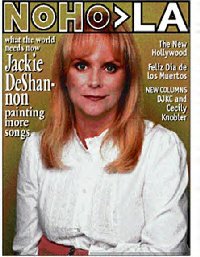
Jackie received the Lifetime Achievement Award for Local Talent at NoHo>LA's Third Anniversary Party and Awards Celebration on October 13, 2002.
Congratulations, Jackie!!!
